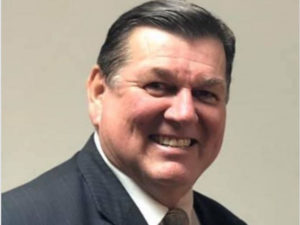
- Details
- By Levi Rickert
TULSA, Okla. — Indian Country appears to have one of its first casualties of the COVID-19 pandemic when a Cherokee tribal citizen passed away on Wednesday from the virus.
The Cherokee Phoenix, the official publication of the Cherokee Nation, first reported that tribal citizen Merle Dry of Berryhill, Okla. died after testing positive for the virus. Mr. Dry, 55, was thought to be the first fatality in the state of Oklahoma linked to COVID-19, commonly referred to as novel coronavirus.
Dry, a groundskeeper of Oral Roberts University in Tulsa, Okla., tested positive on Tuesday, March 17. A member of the Metro Pentecostal Church in Tulsa, Dry “was in good health as far as we all knew. He was fighting a cold and then he contracted the coronavirus. He was diagnosed on Tuesday and passed away on Wednesday,” according to a post on the church’s Facebook Page.
“For months, we watched this virus from afar, and now with the passing of a Cherokee Nation citizen in Tulsa County, we hope people understand this has now hit home and is a very real pandemic that can affect anyone of us,” Cherokee Nation Principal Chief Chuck Hoskin Jr. told the Cherokee Phoenix. “We ask that everyone take real safety precautions and on behalf of the Cherokee Nation, our thoughts and prayers are with the Dry family at this time and we are so very sorry for this tragic loss.”
Dry is survived by his wife and two children, who are now under quarantine.
While it's not clear how many other tribal citizens have died from COVID-19, it was reported in early March that Louise Weatherall, reportedly a tribal elder of the Cowlitz Indian Tribe, passed away at the Life Care Center senior facility in Kirkland, Wash.
Cherokee Nation citizens who have questions about the virus, may call the CN COVID-19 hotline at 1-833-528-0063.
Prior to Dry’s death, across Indian Country, there were six confirmed cases of the coronavirus across Indian Country: one at Yankton Nation in South Dakota; two in the Lummi Nation in Washington; and three on the Navajo Nation in Arizona.
Editor’s Note: Native News Online is dedicated to providing the most accurate and up-to-date information about the COVID-19 pandemic’s impact on Indian Country. Please feel free to email us with any news you may have about the virus at [email protected]
More Stories Like This
Native News Weekly (August 25, 2024): D.C. BriefsNative News Weekly (February 22, 2026): D.C. Briefs
NCAI Releases Sttatement on the Passing of Rev. Jesse Jackson
Colusa Indian Energy Participates in Port of Quincy Town Hall on Columbia Basin Power Project
Q&A: Jingle Dress Dancer Answered Call to Ceremony in Face of ICE Violence
Help us defend tribal sovereignty.
At Native News Online, our mission is rooted in telling the stories that strengthen sovereignty and uplift Indigenous voices — not just at year’s end, but every single day.
Because of your generosity last year, we were able to keep our reporters on the ground in tribal communities, at national gatherings and in the halls of Congress — covering the issues that matter most to Indian Country: sovereignty, culture, education, health and economic opportunity.
That support sustained us through a tough year in 2025. Now, as we look to the year ahead, we need your help right now to ensure warrior journalism remains strong — reporting that defends tribal sovereignty, amplifies Native truth, and holds power accountable.
 The stakes couldn't be higher. Your support keeps Native voices heard, Native stories told and Native sovereignty defended.
The stakes couldn't be higher. Your support keeps Native voices heard, Native stories told and Native sovereignty defended.
Stand with Warrior Journalism today.
Levi Rickert (Potawatomi), Editor & Publisher

